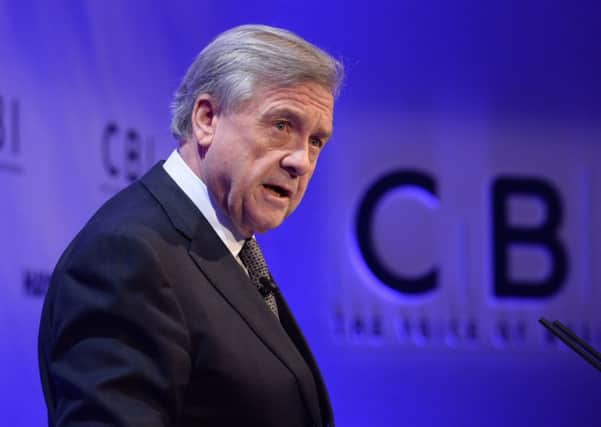CBI boss: Business is not the enemy of the people


Sir Mike, president of the CBI, said that although business is suffering a crisis in public confidence, Britain can only thrive if it has strong, productive businesses, large and small, in all sectors.
“Some of the rhetoric we’ve heard recently suggests that business is somehow the enemy – we are not, and this could not be further from the truth,” he told business delegates from around the country.
Advertisement
Hide AdAdvertisement
Hide Ad“We want to be, we can be, and we are partners in building prosperity. Business is undoubtedly suffering a crisis in public confidence – as we have seen in banking, and now in the current debate around energy.”
The comments by Sir Mike, who is chairman of BT, follows increasing anger over gas and electricity price rises.
Sir Mike said “over simplistic” statements on price controls, or possible windfall taxes on energy firms, played to public opinion.
“But they will not address the complex problems that need to be resolved – indeed, they are very likely to have the opposite effect.”
Advertisement
Hide AdAdvertisement
Hide AdTransforming the energy market will be costly, he warned, adding: “The obvious issue is how to balance long-term investment with the short-term pressures on household budgets.
“People are of course concerned about rising prices. They feel, rightly or wrongly, that they’re being unfairly treated.”
Trust in business was a key theme of the conference with Centrica’s chief executive Sam Laidlaw admitting that trust in the energy sector is at an “all-time low” and there is an urgent need to rebuild trust with consumers.
Speaking at a debate entitled ‘Business Trust Under the Spotlight’, Mr Laidlaw revealed that he has decided to forgo his bonus this year amid anger over ever-rising household bills.
Advertisement
Hide AdAdvertisement
Hide Ad“I’ve already decided to turn down my bonus,” he told delegates when asked.
“We’re in the eye of the storm in the energy sector. Trust in the sector is at an all-time low. The solution is action not words.”
The boss of Centrica, which owns British Gas, added: “Just to continue in this world where households are under pressure, and assume it is business as normal, is not the way thoughtful remuneration committees think about it.”
Mr Laidlaw said that if the Government reduces environment and social levies, cost reductions would be passed on to customers.
Advertisement
Hide AdAdvertisement
Hide AdHe added that energy firms should be more transparent and explain how bills are made up and improve the process of switching suppliers.
Mr Laidlaw said he was focused on helping customers struggling to pay bills this winter. He said that more than half a million British Gas customers will receive a £60 winter discount, which comes on top of a £135 warm home discount.
He added that Centrica reduced its costs by £300m over the past few years.
“We are listening – we get it, absolutely. We know there is a problem.”
Advertisement
Hide AdAdvertisement
Hide AdFollowing calls for cheaper bills, he said there was no scope for switching profits from one part of the business to another.
Speaking earlier at the conference, shadow chancellor Ed Balls said the Government has to step in “when markets fail” or it risks losing public faith.
The Labour party has proposed freezing energy bills.
“Markets promote growth and innovation and reward entrepreneurship – and when they are competitive they should set prices, not the Government or anyone else,” he told the conference.
“But being pro-market and pro-competition also means acting when markets fail and competition does not operate. Otherwise we risk public support.”
Advertisement
Hide AdAdvertisement
Hide AdSir Philip Hampton, chairman of RBS, and Justin King, chief executive of Sainsbury’s, had very different views on business trust when they both spoke at the debate.
Sir Philip said there isn’t universal mistrust and he doesn’t believe we are going through a crisis of capitalism.
Mr King took a much harder view:
“I think there is a crisis of trust,” he said.
“(The) horsemeat (scandal) was a real shock to the system. It reconfirmed for us we were doing the right thing – DNA tests for the past 10 years.
“Our customers say: ‘What were you doing before this was an issue? It’s about doing the right things before you were forced to do them’.”